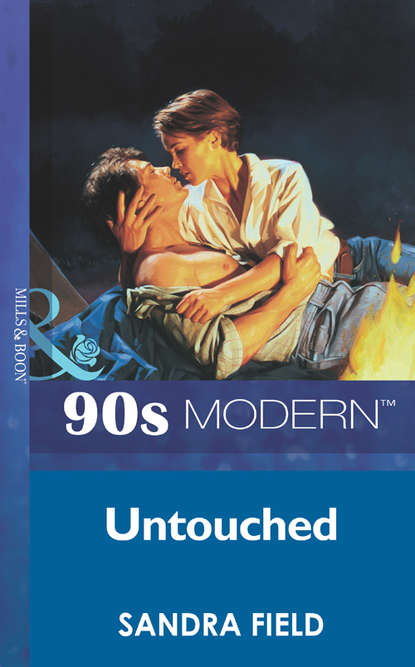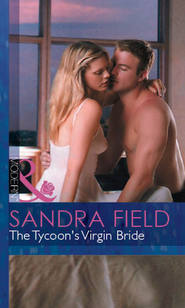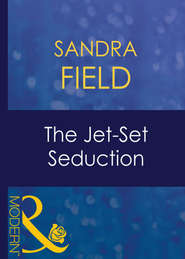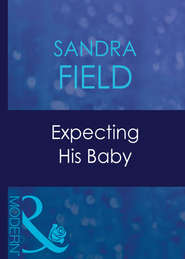По всем вопросам обращайтесь на: info@litportal.ru
(©) 2003-2025.
✖
Untouched
Автор
Год написания книги
2018
Настройки чтения
Размер шрифта
Высота строк
Поля
She glanced up. His hair, newly trimmed and entirely civilized, made his features look all the more rough-hewn; she had no idea what he was thinking. ‘No,’ she said.
He said quietly, speaking to her alone, ‘Then I’ll tell you ... I was in Tunisia once and I found an old ceramic pot buried by a dried-up pond. The pot was stained and dirty and filled with mud. So I took it back to the camp and washed it very carefully and polished it with a soft cloth—and then I saw that it had an exquisite design of tiny green birds and marsh reeds etched all around the lip. It was very beautiful.’ He looked at her, his dark blue eyes fathomless. ‘That was why I wanted your hair cut.’
A tide of hot color swept across Jenessa’s cheeks. For several seconds she was literally speechless. Then she whispered, ‘Beautiful? Me?’
‘Jenessa, where have you been all your life? Yes, beautiful.’
Alice gave a sigh of repletion. ‘My, oh, my, I wish I’d had my video camera for that,’ she said soulfully. ‘Better than Another World.’
Jenessa scarcely heard her. Like a woman in a dream she walked over to the little mirror that hung over the sink and stared at herself. She had no need of make-up, she thought. Her cheeks were flushed, her eyes shining; she looked as fully alive as a brightly colored butterfly dancing from flower to flower in the sunlight.
Behind her Finn said abruptly, ‘We’d better go. We’ve got to figure out our route, and I need some kind of time frame so I can phone my company. Thanks for the boots, Ruth—coming, Jenessa?’
Trying to gather her wits, Jenessa dropped a kiss on Stephen’s fluffy hair, hugged Ruth and Alice, whose eyes were almost popping out of her head, and walked outside to the van. Driving gave her something to focus on, and Finn said not a word as they crossed town to the motel. She parked in front of his unit and followed him into the room. The door clicked shut behind them.
His luggage was neatly stashed against the wall, the blue shirt he had been wearing last night was hanging over the back of one of the chairs and a bundle of papers and maps had been thrown on the bed. The maps seemed to steady her; she knew about maps, knew how to read them and transpose the thin lines on the paper to the actual contours of the land. She took a deep breath and said with commendable matter-of-factness, ‘Show me where you want to go.’
He sat down on the edge of the bed, unfolding a map of the whole province as well as two detailed topographical maps. ‘We’ll fly by helicopter into this lodge,’ he said, ‘I have connections with the oil companies, and I can get a ’copter any time I want one.’
Casually Jenessa sat down beside him, one leg tucked under her, following the line of his finger to a lake well south of the highway. Her eyes widened in dismay. Caribou Lake. Of all the thousands of lakes in Newfoundland, Finn Marston wanted to go to Caribou Lake.
‘The lodge is called Caribou Outfitters. Run by a guy called Lloyd MacDonald—calls himself Mac; I’ve already talked to him. Do you know the area at all?’
‘I know it very well,’ she said raggedly.
He shot a quick look at her. ‘You’ve been there before?’
‘Many times.’ With at least partial truth she said, ‘I used to work for Mac. A couple of years ago. I don’t see why you need me if you’re going to his lodge; he has his own guides.’
‘I’m only using the lodge as a base. This is where I really want to go.’
With true incredulity Jenessa watched his finger move still further south into a network of lakes and still waters that she could have traced on the map with her eyes shut. In a cracked voice she said, ‘That’s Hilchey land—what do you want to go there for?’
‘You’re familiar with it?’
‘He’s dead—old Mr Hilchey. He died six months ago. Why do you want to see his property?’
‘I asked you a question, Jenessa—are you familiar with that land?’
She gave a short, unamused laugh. ‘I’ve walked every ridge and barren, and canoed every waterway from Caribou River to Indian Brook.’ And if she had ever hated anyone in her life, it had been George Hilchey.
Finn spread out one of the topographical maps. ‘It’s a huge area; how could you know it so well?’
The names on the map jumped out at her. Osprey Falls, Beothuck Pond, Juniper Lake. Names and places that she had discovered as a child and loved with all the passionate intensity of a child. To the east lay Spruce Pond, where she had lived with her father for thirteen years on a tiny cove in sight of two tree-clad islands; her eyes shied away from it, for she had never once gone back there and now doubted that she ever would. She said, hard-voiced, ‘Why do you want to go there, Finn?’
His mouth tightened. ‘Curiosity,’ he said.
‘That’s no kind of an answer!’
‘It’s all the answer you’re going to get. George Hilchey used to have a summer place here on this lake—I want to visit it, and check out the area while I’m there.’
‘I wish you’d told me this last night,’ she said tautly. ‘It would have saved both of us a lot of trouble. For reasons that are nothing to do with you, I can’t possibly go there.’
His eyes narrowed, the force of his will-power like a blast of cold wind. ‘You’ll go,’ he said.
‘One of Mac’s guides will take you in—you’d have to go by canoe.’
‘Canoe?’
‘It’s the only way to get there.’
‘I’ve never been in a canoe in my life!’
‘A new experience for you,’ she said ironically.
‘Jenessa, in case you haven’t heard of them, there’s a marvellous twentieth-century invention called a float plane. It lands on lakes. This place is riddled with lakes.’
‘You see these crosses on the lake? Those are rocks. Big rocks. They don’t bother marking all the little ones. Plus there are deadheads in those waters—submerged logs—from the days of the log jams on the rivers. No pilot in his right mind is going to risk a float plane on those waters.’
‘We’ll take the helicopter in.’
‘No clearings. Hilchey’s summer place hasn’t been used in twenty years—the alders will have taken over.’
‘For God’s sake!’ Finn exploded. ‘It’ll take days to get in there by canoe.’
‘A week, I’d say.’
‘Then another week to get out—I haven’t got that kind of time to waste.’
She shrugged, tamping down a mixture of emotions too complicated to analyze. ‘Have the helicopter fly low over the land; that should satisfy your curiosity. It’ll cost you a small fortune, mind you. Although,’ she added with a touch of malice, ‘you’ll be saving seven hundred a week.’
‘But you’re saying the ’copter can’t land at the summer house.’ He got up from the bed, prowling round the room like a caged bear. ‘Couldn’t you get there in less than a week?’
She shook her head. ‘That’s back country ... a strong wind can easily hold you up for a couple of days. Besides, if your guide has any sense, he’ll keep you two or three days at the lodge learning the essentials of canoeing before you set out. There’s whitewater on some of those rivers, and you’re miles from anywhere.’
He glared at her. ‘So now it’s three weeks!’
‘Finn,’ she said curiously, ‘how long is it since you’ve taken a holiday?’
‘I forget.’
‘The wilderness has its own time scheme. Dawn and dusk, winds and rain ... you can’t force it or control it.’
‘I don’t think you understand—I run a multi-million-dollar business,’ he snapped. ‘Big-league stuff.’
‘Then go back to it and forget about George Hilchey’s summer house,’ she said indifferently.
He thrust his hands in the pockets of his jeans. ‘It’s a wonder to me that none of your clients has ever shot you rather than the moose.’











